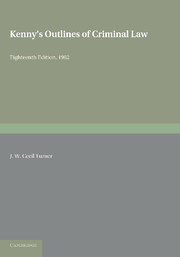Book contents
- Frontmatter
- Preface to the Sixteenth Edition
- Preface to The Seventeenth Edition
- Preface to the Eighteenth Edition
- Contents
- Index of cases
- Index to the principal statutes
- List of principal books cited
- BOOK I GENERAL CONSIDERATIONS
- BOOK II DEFINITIONS OF PARTICULAR CRIMES
- CHAPTER VII HOMICIDE
- CHAPTER VIII OFFENCES AGAINST THE PERSON THAT ARE NOT FATAL
- CHAPTER IX BIGAMY
- CHAPTER X CRIMINAL LIBEL
- CHAPTER XI OFFENCES AGAINST PROPERTY
- CHAPTER XII BURGLARY AND HOUSEBREAKING
- CHAPTER XIII STEALING
- CHAPTER XIV EMBEZZLEMENT
- CHAPTER XV FRAUDULENT CONVERSION
- CHAPTER XVI CHEATS PUNISHABLE AT COMMON LAW
- CHAPTER XVII FALSE PRETENCES
- CHAPTER XVIII RECEIVING STOLEN PROPERTY
- CHAPTER XIX OTHER OFFENCES INVOLVING FRAUD
- CHAPTER XX FORGERY
- CHAPTER XXI OFFENCES AGAINST THE STATE
- CHAPTER XXII CONSPIRACY AND INDUSTRIAL DISPUTES
- CHAPTER XXIII PERJURY AND OTHER OFFENCES AGAINST PUBLIC JUSTICE
- CHAPTER XXIV OFFENCES AGAINST INTERNATIONAL LAW
- CHAPTER XXV OFFENCES OF VAGRANCY
- BOOK III MODES OF JUDICIAL PROOF
- BOOK IV CRIMINAL PROCEDURE
- Appendix I The meaning of ‘credit’
- Appendix II II Rules as to admission of evidence which reveals to the jury facts discreditable to the person accused
- Appendix III III Forms of indictment
- Index
CHAPTER XIII - STEALING
from BOOK II - DEFINITIONS OF PARTICULAR CRIMES
Published online by Cambridge University Press: 05 June 2016
- Frontmatter
- Preface to the Sixteenth Edition
- Preface to The Seventeenth Edition
- Preface to the Eighteenth Edition
- Contents
- Index of cases
- Index to the principal statutes
- List of principal books cited
- BOOK I GENERAL CONSIDERATIONS
- BOOK II DEFINITIONS OF PARTICULAR CRIMES
- CHAPTER VII HOMICIDE
- CHAPTER VIII OFFENCES AGAINST THE PERSON THAT ARE NOT FATAL
- CHAPTER IX BIGAMY
- CHAPTER X CRIMINAL LIBEL
- CHAPTER XI OFFENCES AGAINST PROPERTY
- CHAPTER XII BURGLARY AND HOUSEBREAKING
- CHAPTER XIII STEALING
- CHAPTER XIV EMBEZZLEMENT
- CHAPTER XV FRAUDULENT CONVERSION
- CHAPTER XVI CHEATS PUNISHABLE AT COMMON LAW
- CHAPTER XVII FALSE PRETENCES
- CHAPTER XVIII RECEIVING STOLEN PROPERTY
- CHAPTER XIX OTHER OFFENCES INVOLVING FRAUD
- CHAPTER XX FORGERY
- CHAPTER XXI OFFENCES AGAINST THE STATE
- CHAPTER XXII CONSPIRACY AND INDUSTRIAL DISPUTES
- CHAPTER XXIII PERJURY AND OTHER OFFENCES AGAINST PUBLIC JUSTICE
- CHAPTER XXIV OFFENCES AGAINST INTERNATIONAL LAW
- CHAPTER XXV OFFENCES OF VAGRANCY
- BOOK III MODES OF JUDICIAL PROOF
- BOOK IV CRIMINAL PROCEDURE
- Appendix I The meaning of ‘credit’
- Appendix II II Rules as to admission of evidence which reveals to the jury facts discreditable to the person accused
- Appendix III III Forms of indictment
- Index
Summary
Section I. Historical Outline
COMMON LAW DEFINITION
The distinctive feature of the crimes so far discussed has been the physical or material harm they cause to their victims, rather than any economic advantage they bring to the offender. But we now pass to offences of dishonesty, in which the main purpose is the unlawful enrichment of the perpetrators without necessarily doing any physical hurt to person or to property. Of these die most ancient in English law and the most common at the present day is theft, or larceny. The first comprehensive definition of theft for English law was given by Bracton (who borrowed it, with some modification, from Roman law) as contrectatio rei alienae fraudulenta, cum animo furandi, invito Mo domino cuius res ilia fuerit (‘ The fraudulent handling of another man's thing, without his agreement, and with the intention of stealing it’). The Latin word fraudulenta had a wide meaning in Roman law and covered dishonest dealing of many subtle kinds involving deceit and trickery; but in the days when our common law crimes were first defined the economic relations of men were simple and the main need of society was for legal protection against crimes of physical force rather than against deceit. The crime of theft, or larceny, began as a trespass vi et armis, and the purpose was no more than to punish such dishonest dealing as took ‘the violent and unmistakable form of a change of possession’. The actual taking and carrying away of the material object itself has remained to the present day as an essential requirement in the crime of stealing. No one can commit larceny of anything incorporeal such as a copyright, or a debt, or the value of anything.
NARROW CONCEPTION OF THEFT IN EARLY LAW
The ancient conception of theft was subsequently narrowed still further by various subtleties which were introduced by judicial decision. Some of these limitations would seem to us unaccountable, if we did not know that they had been inspired by motives of humanity.
- Type
- Chapter
- Information
- Kenny's Outlines of Criminal Law , pp. 253 - 319Publisher: Cambridge University PressPrint publication year: 2013



